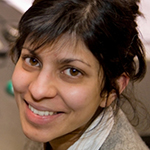Teena is a vehicle dynamics researcher at Coventry University and a consultant to the motorsport industry. She’s only 33, but she has already worked as an aerodynamicist with the Williams Formula One team and as a rally engineer with Prodrive. Recently featured in The Guardian as a role model for aspiring female engineers, we interview her to find out more about her work…
Can you tell us a little bit about the work you are currently doing at Coventry University?
My subject area is mechanical engineering, specifically vehicle dynamics. In a nutshell…we do clever stuff. That is essentially what ourremit is. We are not limited to just looking at cars, we can extend the scope to anything that involves mechanical systems essentially with moving parts. So it’s a very broad scope. Our specialities include understanding not only the mechanics of how a car works but also having an understanding, not just in the virtual sense but also in the physical sense, of what translates into good steering feel. For example- what makes a driver happy, what makes a car enjoyable to drive and easy to drive- the message really is that: ask us and we’ll tell you!
What exactly sparked your personal interest within this field?
I was always going to be an engineer- that was a given from a very young age. I studied mechanical engineering as my Bachelors degree and then did a Masters in advanced computational methods in aeronautics, which is my specialty. I went on from there to work in various motorsport jobs, mainly starting off in data analysis and then moving on into performance analysis with a little bit in development engineering- which is where my passion lies now. I am not so much into doing the racing rather I am interested in how it is developed and created.
Have you always known that you would be an engineer?
Yes- that’s just a fact!
Being a successful female in this field typically raises a few questions. What sorts of controversies did you face- were there any?
In all honesty, no!
It frustrates me a little bit that people think there is some barrier to entry- there really isn’t. The only barrier is yourself and, you know, engineering is not for everyone… but if it is what interests you, all you need to do is work at it and it’s as simple as that. I really don’t think your gender holds you back. Engineers are also a very broad scope of people, so they can be very practical, very hands on, more than likely to bolt bits of a car together. On the other hand…they can be very mathematical, very theoretical, and probably if you put a spanner in their hands they wouldn’t know one end from the other! One can’t survive without the other and we all know that- once you start engineering you know where you fall and you learn where you fit in somewhere- especially within an organisation.
Engineering is perceived by many to be quite masculine and male dominated. Why do you think that is?
To be honest the reason is simply because Science and Engineering doesn’t particularly promote itself very well. We call people who repair photocopiers ‘engineers’ and that isn’t what we do. Most engineers can break a photocopier for sure! But the reality is that Science, as a general rule, has a diminishing uptake at school and amongst children. It’s just because the subject is not ‘cool’ and it’s not perceived to be interesting. I think we have to make it more interesting from early on.
Could you list some major breakthroughs within your career? Any developments that really stand out for you?
Well, I’ve mainly been a part of teams and that is one of the things that I like the most about engineering. It isn’t something you can achieve on your own and the final result is always bigger than the sum of its parts. There are probably two things that have really stood out in my career to date. The first one being the Landspeed record at JCB Dieselmax, which was the most amazing experience and a fantastic team was put together by JCB. It was only 9 or 10 months of my life but I still look back at the time with incredible fondness. The second one was having the chance to work with Prodrive on the MINI World Rally Scene.
What are you researching at the moment?
Currently we have got a number of projects on which are quite diverse. One of them is mathematical and statistical, particularly looking at Design of Experiments methods with the multibody systems software Simpack but that is essentially quite an abstract thing and hugely theoretical. Then on the other end of the spectrum is a project we are working on with Protean Electric who specialise in hybrid vehicles, their particular niche is that they put the motors directly into the wheels meaning manufacturers can retro-fit an electric hybrid system to an existing vehicle. What this has implications of in particular is the vehicle handling and how the vehicle performs and it changes the weight inertia characteristics which fundamentally drives how that vehicle responds. What we are looking at is the safety implications of this and what level of fault the average driver can control – at the minute it’s in simulation and we will go on to validate Protean’s track work on it.
If you would like to find out more about experts within the Faculty of Engineering and Computing please contact business.ec@coventry.ac.uk or visit www.coventry.ac.uk/ecbusiness.




Comments are disabled